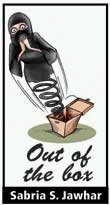Tuesday, 03 April 2007
By Sabria S Jawhar
The Saudi Gazette
IN the absence of scientific data to gauge public opinion, such as from surveys and polls, the Commission for the Promotion of Virtue and the Prevention of Vice utilizes a new approach to evaluate its members' field performance.
Al-Madina newspaper this week published a report that aroused my admiration for the commission's new strategy to deal with both the rapid social and economic changes in Saudi Arabia today.
The report was about a study carried out by the Institute of Research and Consultation Services at Imam Muhammad Bin Saud Islamic University in Riyadh. The study is aimed at identifying the problems the Commission's members (mutawwas) face on field assignments and the reasons behind them.
It also tackles what they are supposed to be doing, how they are doing it and the efficiency of the new communicative approaches they are adopting as a step towards improving general performance.
The two-year-long study is divided into two parts: theoretical and experimental. It covers 240 commission members, 65 heads or directors of the commission's branches, 390 members of other related government establishments, and 2,600 citizens.
The study also examines important areas such as preparation, selection and training of staff. Such a study might be perceived as a "so what?" or a "must," but, as I always maintain, knowing the background of a problem helps to better understand it and, in this case, shows the value of such an initiative taken by the Commission.
The dramatic social and economic developments of late in Saudi Arabia have visibly opened gaps in the society, especially between the new generation that represents more than 60 percent of the population and the Commission that works to make sure that everyone adheres to Islamic values.
The reason can be summarized in the two sides' different perceptions of the rapid social changes. The youngsters believe they have the right to be their age in public and wear what they want while the Commission's members perceive this as un-Islamic and mimicking the West; therefore, they try their best to keep it to a minimum if not totally stop it.
The youngsters believe that what the members of the Commission are calling for would make them lag far behind the social and economic changes taking place in the world around them.
Disputes arising from such misunderstandings seemed to be behind the Ministry of Interior's decree that those arrested for moral offenses should be handed over straight to the public prosecutors instead of the religious police.
Awareness of some moderate members of the Commission of the increasing local and international criticism of their role has brought about more scientific approaches in their dealings with the public. A number of programs were introduced aimed at educating and training the Commission's members. Last month, for instance, the Commission conducted training courses to familiarize 375 of its members with cyber technology to help monitor moral offenses The program included a study on the proliferation of cyber culture with particular focus on computer-related offenses and how to detect and deal with them, as well as specialized training courses to obtain the ICDL (International Computer Driving License).
Prior to this, the Commission launched a training and orientation program on the rules of Fiqh (jurisprudence). The program was accompanied by workshops to introduce the criminal procedures system and demonstrate how the mutawwas should deal with the public in view of the recent developments, including the good manners to be shown during an assignment.
Even the ways they should deal with non-Muslim tourists were recently discussed between the Supreme Commission of Tourism and the mutawwas.
All these reflect a change in the commission's strategy and a tendency towards moderation. It also reflects coordination with other authorities in line with the country's general policy of openness. Within those broad scientific mechanisms designed to bolster efficiency, exist the seeds of a real understanding of the Commission's social and religious role. This understanding, if fostered, would minimize conflict and increase acceptance of the real vital role it should be playing to strike a balance between culture and identity on one hand and openness on the other. This would also minimize the outside pressure on the Saudi Government in this regard.
Thursday, April 12, 2007
Subscribe to:
Post Comments (Atom)


No comments:
Post a Comment